 |
 |
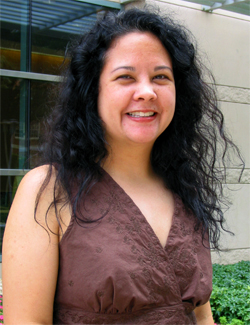
|
|
Faith Pangilinan, Biologist, Research Fellow, Genome Technology Branch, National Human Genome Research Institute, National Institutes of Health, Bethesda, Maryland
|
1. I chose this career because...
2. My typical workday involves...
3. What I like best/least about my work...
4. My career goals are...
5. When I'm not working, I like to...
|
|
1. I chose this career because...
|
Back to Top

|
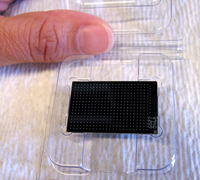
|
|
Faith holds a Sequenom SpectroCHIP that contains 384 genotyping samples which will be analyzed by mass spectrometry.
|
I chose to become a biologist because I have always been fascinated and awed by the subject of biology. It took me a long time to figure out that I wanted to specialize in the field to become a geneticist.
In high school, I enjoyed math and science. I especially liked biology. My guidance counselor encouraged me to pursue one of three paths: medicine, law or engineering. The process of elimination led me to engineering since I thought medicine would be time consuming, and law sounded boring. I didn’t know much about engineering and hoped that biomedical engineering would be interesting since it involved biology. If I had realized then that becoming a scientist was an option, I’m sure I would’ve gunned for that.
I started college majoring in biomedical engineering, but felt that the science was too applied. It was geared towards solving technical problems or filling a technical need. I added a liberal arts degree to explore the relationship between science and society. While still in college, I started a part-time laboratory job. The experience helped me realize that I love working in an environment that requires and encourages my curiosity about the mysteries of living systems. My interest in undergraduate classes in molecular biology and genetics led me to decide to pursue a research career in genetics research.
College Education
- Doctor of Philosophy, Biology (Human Genetics & Molecular Biology), Johns Hopkins University, http://www.jhu.edu/, Baltimore, Maryland
- Bachelor of Science in Engineering with honors, Biomedical Engineering, University of Iowa (http://www.uiowa.edu/), Iowa City, Iowa
- Bachelor of Arts with honors, Literature, Science and the Arts, University of Iowa (http://www.uiowa.edu/), Iowa City, Iowa
|
|
2. My typical workday involves...
|
Back to Top

|
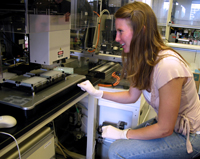
|
|
Faith recently taught one of her students how to operate a robot (the Beckman Multimek 96) that dispenses solutions to 96 samples at once for fast and efficient genotyping.
|
My typical workday changes a lot, depending on what the current project requires. Now, I am working on identifying genetic risk factors for a common birth defect known as spina bifida (http://www.nlm.nih.gov/medlineplus/spinabifida.html). During development, the neural tube is the structure that will form the spinal cord and brain. It starts as a flat structure that rolls up into a tube. If the tube doesn’t close properly, the spinal cord is damaged, which can result in lifelong medical problems. Our lab collaborates with other investigators at the NIH and in Ireland to work on understanding how genetic variation can contribute to spina bifida. Genetic variation can be defined as the study of the similarities and differences in the sequence of DNA (Deoxribonucleic Acid, http://www2.merriam-webster.com/cgi-bin/mwmednlm?book=Medical&va=dna) among individuals.
My Typical Tasks
- Performing Laboratory Procedures – When I started working on this project, I did a lot of lab work including genotyping with robotic equipment. Genotyping involves laboratory procedures that reveal the genetic constitution of an individual. I still feel very fortunate to work at the NIH where we have access to a high-throughput genotyping platform.
- Computer Screening of Multiple Databases – Over time, my work has shifted almost completely to the computer. For example, I recently had a project that required choosing genetic variants (single nucleotide polymorphisms, or SNPs, http://www.genome.gov/glossary.cfm?key=single%20nucleotide%20polymorphisms%20%28SNPs%29) in 80 candidate genes to screen as risk factors for spina bifida. I compiled information from public databases to choose our top 1536 candidate SNPs from the thousands that were available.
- Analysis & Writing – I also needed to hone my computer skills to handle all the genotyping data we generate, not to mention the analysis. Now I am analyzing data from previous experiments and projects. After the analysis, I write up the results.
- Mentoring – For my current project in particular, it’s important to enjoy teamwork. I work with post baccalaureate students helping them learn laboratory procedures and how to design and perform experiments. I also interact with our collaborating colleagues on several projects.
|
|
3. What I like best/least about my work...
|
Back to Top

|
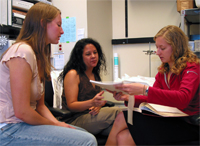
|
|
Faith, and the post-baccalaureate students she mentors, review recent data and discuss further experiments.
|
What I like best about my work is that I continue to be absolutely amazed by genetics. I’m particularly interested in how genetic variation among individuals can affect disease susceptibility or response to medication. It’s fascinating how our DNA makes us who we are. Lab research is a great fit for me because it requires a great intersection of my curiosity, my analytical skills, and the satisfaction of hands-on work.
What I like least about my work is the frustration factor. You need to be very patient and painstakingly careful to be a scientist. Sometimes you need to develop new ways of doing experiments, or you need to figure out why an experiment didn’t work. Of course you do what it takes: go over every possibility, seek advice, double-check the literature, and maybe even develop some superstitions. By nature, scientific research generally involves incremental progress despite tremendous effort. Persistence is key.
|
|
4. My career goals are...
|
Back to Top

|
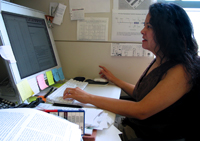
|
|
Faith works on her computer searching other public databases for gene variants and analyzing data from completed experiments.
|
My career goals are unknown at this point. There are so many possibilities right now. When I started pursuing my Ph.D., I thought I’d like to run my own lab in an academic institution. Since then, I’ve realized there are many opportunities in the private sector and with the government. It’s going to be hard to decide, but it’s good to know so many doors are open.
|
|
5. When I'm not working, I like to...
|
Back to Top

|
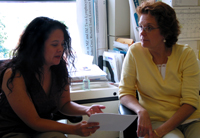
|
|
Faith collaborates with other scientists on several projects, and as seen here, discusses a recent experiment with a colleague in her lab.
|
When I’m not working, I like to dance. I’ve being dancing West Coast swing for several years, and like to go 3-4 nights a week. I started dancing because of a class I took through the Recreation and Welfare Association here at the NIH. To find out about the local dance schedule, I check out DC’s Swing and Country Dance Website http://www.dance-info.com/. I also enjoy reading, baking and spending time with my husband and cat.
|
|
|
|
 |